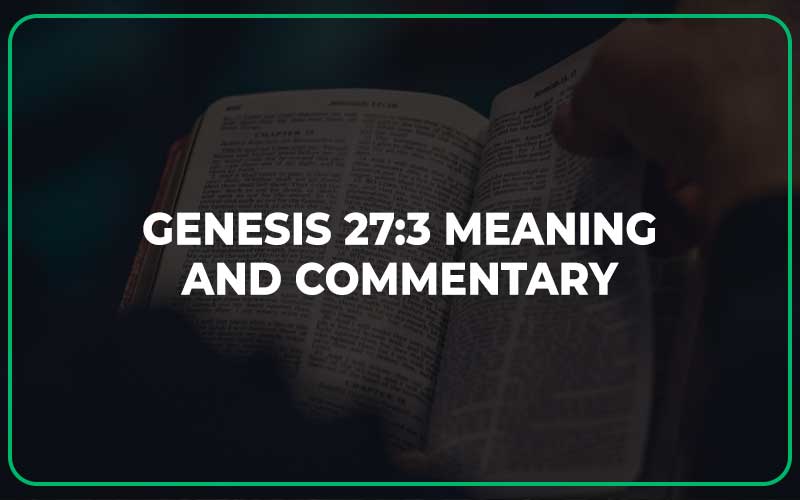Genesis 27:3
“Now then, get your equipment—your quiver and bow—and go out to the open country to hunt some wild game for me.”
Genesis 27:3 Meaning
Genesis 27:3 is part of the story of Isaac, the son of Abraham, and his sons Jacob and Esau. Isaac was nearing the end of his life and wanted to bless his oldest son, Esau, before he died. In this particular verse, Isaac calls upon Esau to go out and hunt for some delicious meat so that he could prepare a special meal and bless him.
Genesis 27:3 Commentary and Explanation
Genesis 27:3 is a verse that carries significant weight in the bible, as it sets the stage for a pivotal moment in the story of Jacob and Esau.
First, let us consider the broader context of Genesis 27. At this point in the narrative, Isaac, the patriarch of the family, is old and blind, nearing the end of his life. He desires to bless his eldest son, Esau, before he dies, believing that Esau is the rightful heir to the covenant blessings given to Abraham and passed down through Isaac (Genesis 25:23). Isaac’s intention to bless Esau is clear, and he requests that Esau prepare a meal for him, creating the opportunity for the patriarch to bestow his blessings.
However, there is a crucial dynamic at play here. God had previously revealed to Rebekah, Isaac’s wife, that the older would serve the younger (Genesis 25:23). This divine prophecy indicated that Jacob, the younger twin, would ultimately receive the covenant blessings. Rebekah, aware of this divine revelation, sees an opportunity to ensure that God’s plan is fulfilled. She instructs Jacob to deceive his father by pretending to be Esau and receiving the blessing meant for the firstborn.
In Genesis 27:3, we witness Isaac’s instruction to Esau: “Now then, take your weapons, your quiver and your bow, and go out to the field and hunt game for me.” This seemingly mundane directive is the catalyst for the dramatic events that follow. Isaac’s request for a meal of wild game reflects his desire to enjoy one last feast and grant the blessing in a formal and traditional manner, according to the customs of the time.
However, as we examine this verse, we must recognize the complexity of the situation. Isaac’s genuine intent is to bless Esau, but God’s sovereign plan is unfolding through Jacob. This tension between human intention and divine purpose is a recurring theme in the Bible, reminding us that God’s will often supersedes our own desires and plans (Proverbs 19:21).
Furthermore, the use of “quiver and bow” in this verse holds symbolic significance. The bow and arrow represent power and authority, and throughout the Bible, they are associated with warfare and strength (Psalm 18:34). This choice of weaponry may allude to the struggle between the two brothers for the covenant blessings and the power and authority that come with them.
As we reflect on Genesis 27:3 and the events it sets in motion, we are reminded of the importance of God’s sovereignty in our lives. While we may have our own intentions and plans, it is ultimately God’s will that prevails. This verse also prompts us to consider the ethical implications of deception, as Jacob’s actions in the following verses raise questions about the consequences of our choices and the lengths to which we are willing to go to achieve our goals.
Genesis 27:3 serves as a critical turning point in the narrative, highlighting the tension between human desires and divine providence. It invites us to reflect on the sovereignty of God and the ethical dimensions of our actions. As we journey through the biblical narrative, we will continue to see how God’s plan unfolds, often in unexpected ways, to fulfill His promises and purposes.
Also Read: Galatians 6:1 Meaning and Commentary
Context of Genesis 27:3
Genesis 27 tells the story of how Jacob, with the help of his mother Rebekah, tricks his father Isaac into blessing him instead of his brother Esau. Isaac was blind and nearing the end of his life, and he intended to pass on the traditional firstborn blessing to Esau. However, Rebekah favored Jacob and devised a plan to deceive Isaac.
In the preceding verses, Rebekah overhears Isaac instructing Esau to prepare a meal for him so that he can bless him before he dies. Rebekah then convinces Jacob to disguise himself as Esau by wearing Esau’s clothes and covering his hands and neck with animal hides. She also prepares a meal using goat meat instead of the wild game that Isaac desired.

Breaking Down the Key Parts of Genesis 27:3
a) “Now then, get your equipment—your quiver and bow”
Isaac tells Esau to prepare himself with his hunting gear, specifically his quiver (a case for holding arrows) and his bow (a weapon used to shoot arrows). This indicates that Isaac expected Esau to go out and hunt for game.
b) “and go out to the open country to hunt some wild game for me”
Isaac instructs Esau to go into the open country and hunt wild game. This shows that Isaac had a specific preference for the type of meat he wanted for the meal.
Bible Study on Genesis 27:3
The story of Isaac, Jacob, and Esau is a complex narrative that involves themes of sibling rivalry, deception, and the consequences of not honoring parental authority. It serves as a reminder of the importance of integrity and the consequences that can result from deceitful actions.
The passage also highlights the reality of human weakness. Isaac, due to his blindness and old age, was easily deceived, and Jacob, driven by ambition, took advantage of this vulnerability. As believers, we are encouraged to rely on God’s guidance and trust in His plan rather than resorting to deceit or cunning strategies.
Additionally, the story reveals how God’s chosen people were not exempt from making mistakes and facing the consequences of their actions. Jacob and Esau’s relationship was strained due to the deception, and their family dynamics were affected for many years to come. However, we see God’s faithfulness in working through imperfect individuals to accomplish His ultimate plan.
Biblical Translations of genesis 27:3
Genesis 27:3 King James Version (KJV)
“Now therefore take, I pray thee, thy weapons, thy quiver and thy bow, and go out to the field, and take me some venison.”
Genesis 27:3 English Standard Version (ESV)
“Now then, take your weapons, your quiver and your bow, and go out to the field and hunt game for me.”
Genesis 27:3 New American Standard Bible (NASB)
“Now then, please take your gear, your quiver and your bow, and go out to the field and hunt game for me.”
Genesis 27:3 New Living Translation (NLT)
“Here is my bow and arrow. Take them and go out into the open country to hunt some wild game for me.”
Genesis 27:3 The Message (MSG)
“Take your bow and arrows. Go out in the country and hunt some game for me.”
Genesis 27:3 New King James Version (NKJV)
“Now therefore, please take your weapons, your quiver and your bow, and go out to the field and hunt game for me.”
Final Thoughts
Genesis 27:3 teaches us the importance of fulfilling our responsibilities and honoring our obligations, both in our familial relationships and in our broader community. We are called to be faithful stewards of the tasks entrusted to us, knowing that our actions can impact not only our immediate loved ones but also future generations.
Let us commit to approaching our responsibilities with diligence, integrity, and a desire to please God. May we be reminded of the significance of family, caring for one another, and supporting our loved ones physically and spiritually. And above all, may we seek God’s guidance and trust in His plan, knowing that He can work through our imperfections for His glory.

